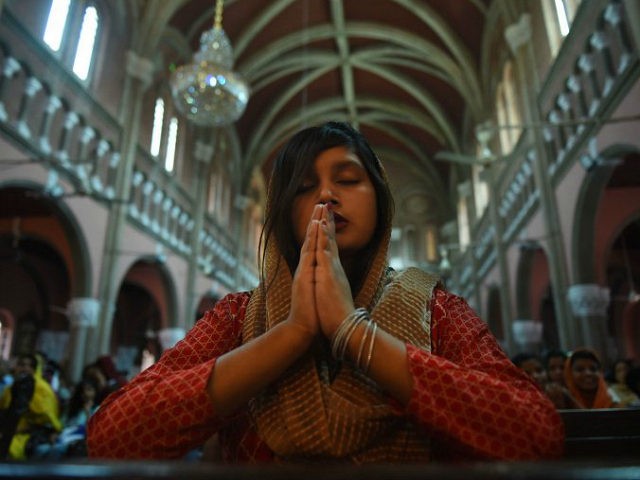Christian groups in Pakistan accused the country’s Muslim leadership of denying religious minorities pivotal economic aid to survive the ongoing lockdown to contain the Chinese coronavirus, the Christian website Aleteia reported on Thursday.
Pakistan is a Sunni Muslim-majority country with sizable Ahmadi Muslim, Christian, and Hindu minorities. Christians often come from lower castes that Muslims, relegated to poverty and arduous labor such as cleaning sewers and running kilns. Prime Minister Imran Khan declared a nationwide lockdown on March 22 to limit the spread of the Chinese coronavirus, fueling a pandemic affecting nearly every country on earth. The lockdown – widely ignored by Sunni Muslims attending mosques to observe the holy month of Ramadan – is set to end on Saturday.
Khan vowed significant government aid to those no longer able to work during the lockdown. In remarks to the Christian organization Aid to the Church in Need, Cecil Shane Chaudhry, the executive director of a Catholic organization called the National Commission for Justice and Peace, said Christians were systematically excluded from receiving aid. Mosques, which have become distribution centers for food and other needs, have explicitly discouraged hungry Christians from availing themselves of the aid.
Chaudhry identified an imam at a mosque in Lahore issuing an announcement explicitly stating, “There will be a ration distribution tomorrow morning for needy people but only for Muslims.” The organization head noted the policy is especially lamentable given that Christians and other religious minorities are disproportionately more likely to be impoverished.
“Mr. Chaudhry gave reports of how Christians in a village near Lahore on Raiwind Road had been denied food aid and how, in a separate incident, about 100 Christian families were excluded from food distribution in Sandha Kalan village, in the Punjab’s Kasur district,” Aid to the Church in Need noted.
“Although plans are being worked on, for now we do not know of [any initiatives to include] religious minority members to ensure their needs are not ignored,” Chowdhry added.
Aid groups and monitor organizations have warned that Pakistan discriminates against religious minorities regarding the distribution of coronavirus aid throughout the ongoing lockdown. In April, the United States Commission on International Religious Freedom (USCIRF) issued a statement demanding Islamabad address the humanitarian needs of the nation’s religious minorities. The commission declared itself “troubled” by the reports and urged Prime Minister Khan to “ensure that food aid from distributing organizations is shared equally with Hindus, Christians, and other religions minorities.”
Some Muslims are also reportedly using the aid to attempt to force Christians to convert to Sunni Islam:
In another incident involving the same organization, Christians were denied food rations. A video circulating on Facebook shows a Muslim man, named Adnan, informing a news reporter that Christians have been barred from receiving food in Karachi’s Korangi area.
According to a report, a cleric named Abid Qadri, who ostensibly heads SWT’s operation in Korangi, instructed workers to give rations to Muslims only. In another video, a Christian woman confirmed that an organization, which she didn’t name, refused to give food to Christians until they recite the kalima, a declaration of Islamic faith.
In late April, Pakistani police opened an investigation into the presumed suicide of a Christian woman, who witnesses said decided to end her life after being refused humanitarian aid.
“Mariam Masih, a mother of three and wife of Tariq Masih, was found hanging from a ceiling fan at her house, according to a Christian rights lawyer,” a Union of Catholic Asian News (UCA) report detailed. “Rahat Austin wrote on Twitter that her starving family had been denied food distributed by the government and NGOs because they were non-Muslims.”
UCA cited several examples of denial of humanitarian aid to Christians: “On April 5, more than 100 Christian families from Punjab’s Kasur district were reportedly excluded from food aid distributed by a village committee comprising Muslims. In another incident, Christians were denied food on April 2 in a village near Lahore.”
Christians have told aid groups attempting to address the lack of support that they have faced significant challenges in finding food and financial resources.
“Some Muslims have felt, ‘I’m doing this out of my responsibility as a Muslim. This is really intended for my fellow Muslims. For me to get the religious merit that is associated with giving to the poor, those funds should go to Muslims since it was given by a Muslim with that intent,'” a Christian man identified as Jonathon told Mission Network News.
“The lockdown had me very frightened, I did not know how I could pay my rent or utility bills which my daily work enabled me to cover. I knew finding food was going to be hard but trusted God for provision – know I can drop this worry and focus on resolving other financial matters on a full belly,” Jameela Bibi, an elder woman who lost her source of income as a domestic worker during the lockdown, told the British Asian Christian Association (BACA). Bibi is among those that BACA has been able to feed with expanded efforts during the lockdown.

COMMENTS
Please let us know if you're having issues with commenting.